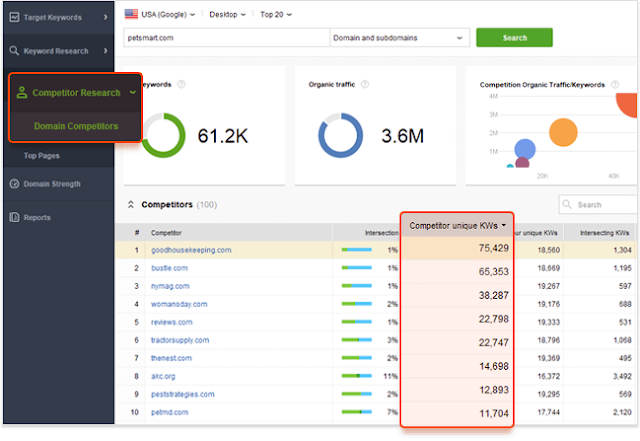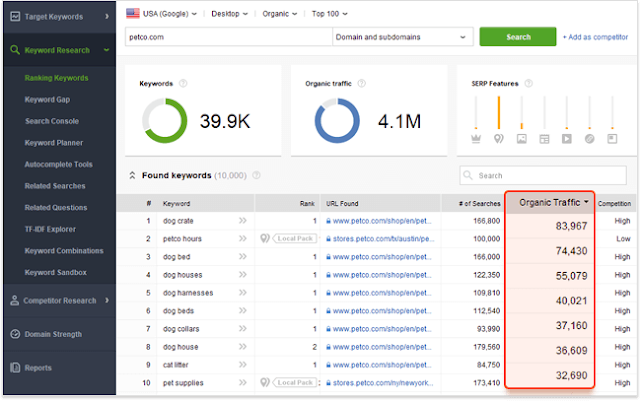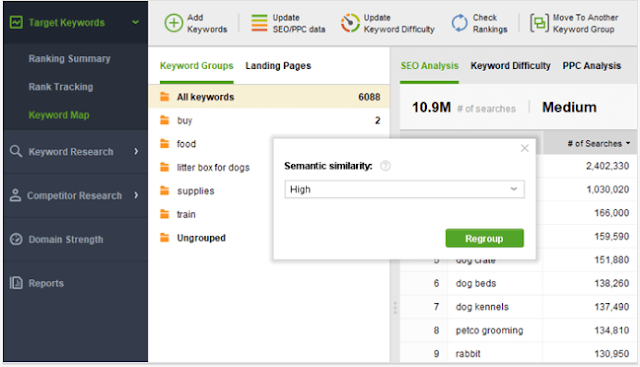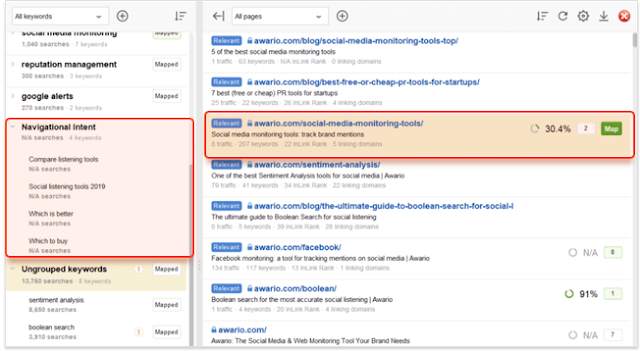Starting with the implementation of semantic search,
Google's been converting its search algorithms to shift recognition from
keyword matching to topic recognition and enjoyable seek a reason to the
fullest extent feasible.
It, however, doesn't advocate that we have to continually
ditch key phrases when constructing an SEO strategy. Keyword studies areas
relevant as ever, and it makes the inspiration for all in addition search
engine marketing activities, including content planning, optimization, and
structuring, internet site's on-page, etc.
But due to the fact the idea of search has changed, the
technique to keyword studies must also change. Let's drill into making the most
of keyword research in 2020.
What to tour by to evaluate key phrases' effectiveness?
In terms of search engine optimization, and efficient the keyword is that the only that you actually can rank for, that could force A sufficient amount of organic visitors to your internet site.
So before you set to keyword studies, you would like to
define criteria that would help you compare the effectiveness of key phrases.
Thus, you may make sure that your target keywords carry you, relevant visitors
which you may be ready to convert this traffic afterward.
Here are a few criteria that have to help you advocate
whether keywords in shape the bill.
Keyword's relevance
If a keyword features a connection with what you offer, then
it's applicable. Bear in mind those not handiest key phrases that describe your
product or service directly healthy into this category. You moreover might also
want people who characterize distinctive troubles and wishes that your service
can assist to resolve and satisfy.
Keyword's capacity organic visitors
If you attempt to pressure visitors to your internet site,
you would love to make certain that a keyword can roll within the hay. However,
what to reflect on consideration on a sufficient amount of visitors highly
relies upon the industry. For instance, in case you are employed during a
broad niche, like touristic services, key phrases might also have 10K — 100K
searches a month, at the same time as in a few field-precise niches like
parachuting gear, search volumes may be a whole lot lower.
To apprehend whether ability traffic is enough, you would really
like to study your aggressive surroundings. Knowing the volumes of visitors
that your topic can produce, you may be extra or less positive approximately
which key phrases to come to a decision or leave in the back of.
Keyword's competition
Knowing keyword's competition is essential to recognize
whether you have got any possibilities to rank for a key-word. Usually, various
search engine optimization equipment provide you with two metrics that you
virtually got to consider — keyword opposition and key-word difficulty.
The keyword issue is a way extra informative, as it takes below
consideration not most effective the amount of competition for the key-word but
additionally their strength (which includes one-way link profiles, etc.). It's
feasible to predict the hassle of ranking for a keyword without the usage of
tools. Google this keyword and appearance at websites that occupy the top three
positions. If you see there any greats like, for instance, Wikipedia or Amazon,
there is possibly an espresso risk of ranking.
Search motive behind a keyword
People search for numerous matters and special purposes, and
search cause shows the purpose of the seek. To rank today, you without a doubt
were given to satisfy users' search cause (remember, Google sets tons thereon
ranking seek effects). So looking for a keyword, you would like to ask yourself
what's the search intent at the back of it, and can you be ready to satisfy it.
The varieties of search cause consist of informational (what
is..., how to..., etc.); navigational (typically there are branded terms);
industrial investigation (like 'excellent espresso machines' or 'black leather
men's backpacks'), and transactional (purchase smith, subscribe download,
etc.).
The handiest thanks to understanding the purpose in the back of keywords
is to have a look at the SERPs to envision what pretty content material Google
is top seeking effects for them.
With all this at hand, let's get to the key-word studies
workflow.
In this article, I exploit search engine marketing Power Suite
equipment for keyword research and analysis. You will use any tool you're
familiar with, as a lot of them offer extra or less an equivalent
functionality.
Keyword research workflow
There are distinct keyword studies tactics. In my opinion,
the best way to find applicable key phrases so that you can probably bring your
traffic is to travel and discover the aggressive environment for your subject
matter. Check out the key phrases that power visitors to the top-ranking
websites in your niche. It’s far an incredible supply of keyword ideas (they
already work!). The method is often divided into several steps, such as:
- Defining your competition;
- Looking for the key phrases that your competitors rank for;
- Selecting target key phrases;
- Identifying search rationale;
- Mapping key phrases to content/pages.
Define your competitors.
Well, you apprehend your niche and already have in thoughts
some of the key phrases describing special services or products that you
honestly provide. Thus, you have a stock of your topics. So you may use them to
start out your search for key phrases, discovering your competition for each
topic.
You can carry these keywords to Google and notice what web
sites take the highest positions. Those would be your competition. But as the
usage of search engine marketing gear makes the whole keyword research method
an awful lot quicker and easier, let's cross this manner.
If your internet site is completely new
Create or open your project in Rank Tracker and attend
Competitor Research > Topic Competitors. Enter your topic seed keyword
within the search bar, set the program, slim your search to the pinnacle-10,
and select Domain and subdomains as seek effects.
As you'll see, there are several giants, like big resellers,
on the li"st, which I might not dare to compete with yet. However, there are
websites of smaller providers, a bit like yours. So let's consider them your
competitors.
The Organic Traffic and Competitor total KWs columns show
you the number of keywords that every competitor ranks for and therefore the
amount of organic traffic that these keywords bring.
Click a little arrow near the competitor's name to ascertain
the web site or a little person button to feature an internet site to your
competitor's list.
If you've got an older website
You can do differently if your website already ranks for a
bunch of keywords and you would like to seek out more to extend the quantity
of traffic that you simply get from search.
Go to Competitor Research > Domain Competitors. Enter
your domain within the search bar and begin searching.
You'll get an inventory of your SEO competitors with the
entire numbers of keywords that they rank for, intersecting keywords (that both
you and a competitor's website rank for), and therefore the number of
competitors' unique keywords (those they rank for and you don't). Here's where
your keyword ideas hide.
Click a little person button to feature an internet site to
your competitor's list.
Looking for the keywords that your competitors rank for.
Now, let's have a better check out the competitor's
keywords. It’ll offer you many ideas about how people find websites that
employment within the same niche as you are doing and providing an equivalent
service. You'll also determine which keywords bring them most of the traffic.
Go to Keyword Research > Ranking keywords, enter your
competitor's domain within the search bar set the program, and choose Domain
and subdomains because of the sort of results.
Sort the results by the Organic Traffic column to ascertain
what keywords bring the foremost traffic to your competitor's website.
Excluding the branded terms, you will have many relevant
keywords that will potentially bring you a sufficient amount of traffic.
There's an alternative choice that you simply can use as
well:
Go to the Keyword Research module and choose the Keyword Gap
option. Enter your domain and your competitors (one of them or several) and
choose the Competitor keywords (any competitor but not your site) because of
the comparison mode.
You'll have a neat list of your industry-related keywords
that your competitors rank for, but you do not, alongside their positions on
SERPs, keyword difficulty scores, the number of searches, competition level,
etc.
Selecting target keywords
Now, you see a plethora of keyword ideas. So you would like
to select those that you're likely to outrank your competitors. Here, keyword
difficulty involves play, helping you to form the proper decision.
In the Ranking Keywords and Keyword Gap sections,
concentrate on the Keyword Difficulty column. The values there show how likely
you'll outperform your competitors. Everything is sort of logical here — the
larger the worth is, the more effort you will need to place into ranking for
the keyword.
But that's not it. To form sure that you simply can rank for
a keyword, you would like to ascertain who else the highest players within the
SERP is for it.
In the Ranking Keywords section, point the cursor to your
competitor's rank within the Rank column, and click on the hamburger icon that
appears there.
The tool will show you the search results for the keyword,
so you will be ready to see who occupies the highest positions and what quite
content ranks for it (so you'll already get a thought of the search intent
behind the keyword)
In the Keyword Gap section, the competitor's rank for the keyword is shown within the column bearing the competitor's name.
Having selected which keywords you would like to focus on,
add them to your keyword list.
Highlight the keywords that you simply want to focus on,
right-click the choice, and choose Move Selected Keyword(s) to Rank Tracking.
Well, your initial keyword list is prepared. But you
continue to go to choose the way to make the foremost of it.
Identifying search intent
Just to recall, you are doing keyword research to create (or
optimize) your website's content around the found keywords, later on. to make
sure that your pages will rank for the target keywords and convey your traffic
that you're going to be ready to convert, you would like to spot what content
people usually expect to seek out when entering this or that keyword within the
search bar. In other words, you would like to spot the search intent behind
your keywords.
To do this, you would like to require your selected keywords
and check the SERPs for them.
You definitely can Google your keywords, one-by-one, and
appearance at the search results to ascertain whether the keyword covers users'
need for information or they utilize a particular search term to match products
or buy them.
I have already mentioned the method you'll identify search
intent. There's another one.
Take one among your target keywords (you may find all of
them safely stored in Target Keywords > Keyword Map) and attend Competitor
Research > Topic Competitors. this point you would like to settle on Exact
URL as search results type.
You'll get an inventory of pages that rank for this keyword.
Click a little arrow sign that appears near the URL and
examine the page which will open a browser. Check all the pages to spot the
sort of content the bulk of them contain. Thus you will be ready to get the
thought about what search intent Google recognizes behind the keyword.
At an equivalent time, you'll already get a clue on which
actions to require outranking competitors.
Examine the Sites Linking to Page column to ascertain the
number of backlinks to competitors' pages. Thus, you'll presume whether writing
better content than that of your competitor would be enough. Or you will need
to market the content to accumulate some good backlinks.
In Rank Tracker, you'll add tags to your target keywords.
And that I recommend you to feature tags pointing at the search intent behind
the keyword. Late on, it'll assist you in mapping keywords to pages, as you'll
already know what sort of content to create around what keywords.
Go to Target Keywords > Keyword Map, right-click the
keyword, and prefer to Add tags to chose record(s) within the menu that
appears.
Mapping keywords to content/pages
Now, you would like to make a decision on the way to use the
keywords that you've got gathered: choose what pages to make around them or
what pages to optimize with them. Mapping keywords to pages can assist you to
track their performance, later on, detect if other pages rank for the incorrect
keywords, and keep control over your SEO.
The Keyword Map option in Rank Tracker and Website Auditor
is supposed to assist you are doing this. There, you'll easily split your
keywords into thematic keyword groups and assign groups of keywords to your
website pages.
Let's create keyword groups in Rank Tracker.
Go to Keyword Research > Keyword Map, and right-click the
folder named All keywords. Then select Regroup within the menu and set the
required level of the semantic similarity: Low, Medium, or High.
Now, let's move to a Website Auditor to map your keywords to
certain pages. (You can roll in the hay in Rank Tracker also but the method
would be more convenient in Website Auditor).
Create or open your project and attend Content Analysis >
Keyword Map and click on Import from Rank Tracker to import your keyword
groups.
In case you would like to maneuver a keyword from one group
to a different (for example, if you realize that the word fits better there),
you'll easily roll in the hay.
Click a button next to the keyword that you simply want to
maneuver and choose a gaggle from the list that appears. You’ll also create a
replacement group for the keyword, clicking Create a replacement keyword group
below the list.
When you click on a keyword (or a gaggle of keywords) on the
left, Website Auditor suggests top-5 relevant pages for it within the middle
column.
Point the cursor to the page to which you would like to
assign your keywords and click on the Map button.
That's it.
As keyword research is over, you'll set to making your
website content.
You need to make sure it targets the proper audience and
satisfies users' search intent. Recently, we've made a comprehensive guide the
way to create an efficient content plan that your business can enjoy. There you
will find the way to set goals for your content, your audiences, and building
content around the right keywords.
Conclusion
Keyword research remains one of the foremost important
stages of an SEO strategy. In fact, it helps to create it and determines many
further SEO activities. Be it on-page optimization, writing and promoting
content for link-building and lots more.
What you would like to stay in mind is that you simply can't
separate keyword research from the SEO goals you would like to succeed in and
approach this step accordingly.

















0 $type={blogger}:
Please do not enter any spam link in the Comment box.